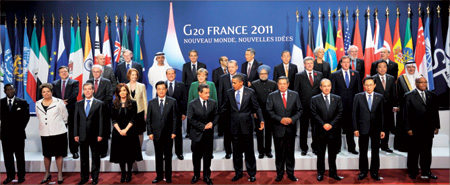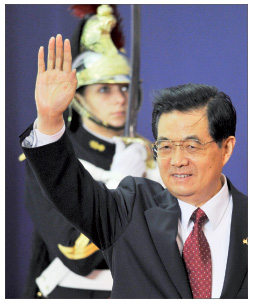Economy looms over G20 summit
Updated: 2011-11-04 11:18
By Wu Jiao (China Daily)
|
|||||||||
|
Leaders of G20 nations and some international organizations participate in a group photo on Thursday at the G20 summit in Cannes, France. Philippe Wojazer / Reuters |
|
President Hu Jintao urged the G20 nations and relevant organizations to advance the reform of the international monetary system. Toby Melville / Reuters |
World leaders considering actions to ease eurozone financial crisis
CANNES, France - President Hu Jintao called for reform of the international monetary system in a speech at the G20 summit that convened on Thursday.
"We should advance the reform of the international monetary system in a steady manner, expand the use of the special drawing rights (SDR) of the IMF, reform the SDR currency basket, and build an international reserve currency system with stable value, rule-based issuance and manageable supply," Hu told heads of state from the 20 major economies gathered at a Riviera resort in Cannes.
According to the International Monetary Fund, the SDR is an international reserve asset created to supplement member countries' official reserves. Its valued is based on four international currencies - US dollar, euro, the Japanese yen and the British pound.
Hu made the remarks against the backdrop of the international financial crisis that has highlighted the deficiencies in the global economic governance system.
The draft action plan that the G20 is finalizing for facilitating world economic growth, as obtained by Reuters, shows the G20 is considering injecting billions of dollars into the global economy through a second special allocation of SDRs.
It is also considering an IMF proposal to create a new short-term credit line to help countries facing economic shocks beyond their control.
Such moves should help manage anxiety over the eurozone crisis that is wreaking havoc with stock and bond markets, Reuters reported.
Previous G-20 summits have discussed the possibility of adding the Chinese yuan, but no attention has been given to this issue during the two-day G20 summit.
Business leaders meeting alongside the G20 summit endorsed a move toward a "multipolar" global currency system, with a greater role for the Chinese yuan.
The B20, a group of dozens of top executives from firms around the world, made the recommendations in a report released on Wednesday that "the current US dollar-dominated system amplifies the risks of the global economy".
A multipolar currency system, it said, would reduce uncertainties and transaction costs for companies, "and would lead to a more balanced global economy".
Zhang Tao, director of the International Department of the People's Bank of China, said China expects the IMF to issue more detailed regulations on the SDR issue.
The IMF has specific regulations on whether China gains the SDR with the exchange of making it's currency, the yuan, convertible, Zhang said.
As a member of the IMF, China respects the SDR arrangement, Zhang said. If the IMF believes that the SDR needs to be reformed in order to beef up the diversification and stability of the international monetary system, China will support the reform, Zhang added.
"Definitely, China has an open attitude about the further improvement of the reform standard," he said.
Addressing a meeting of leaders from the BRICS, that includes Brazil, Russia, India and South Africa, ahead of the G20 summit, Hu said that as the EU is the largest economy in the world, global recovery is dependent on a European recovery.
Stressing China's confidence in the EU's ability to solve the debt problem, Hu said that the "international community should provide support and help" to the debt-ridden eurozone, urging all countries to unify their approach.
Hu also suggested that the financial departments of the BRICS should consult closely to keep track of the changing situation and enhance coordination.
Russian President Dimitri Medvedev was quoted as saying that the meeting discussed "the difficulties in the eurozone" and "the necessity for the BRICS to come up with a common stance".
The Cannes summit, which continues on Friday, will address major problems facing the world economy and the stability of the global financial markets.
Issues to be discussed at the summit include, among others, the eurozone debt crisis, reform of the international monetary system and the strengthening of financial regulations.
European leaders hoped other countries, especially some emerging economies, would buy European Financial Stability Fund (EFSF) bonds, by injecting capital in the region's financial markets.
The EFSF was one part of a three-pronged rescue plan put together to solve the eurozone debt crisis.
Last week, eurozone leaders agreed to boost the EFSF capacity to 1 trillion euros ($1.38 trillion).
Agence France-Presse (AFP) cites figures saying that Asian countries already hold 40 percent of EFSF debt, in testament to the BRICS' huge reserve stockpiles.
Zhu Guangyao, vice-minister of finance, said on Wednesday that "the fund has not established details of its investment options so we still can't talk about the issue of investing".
Brazilian government officials last week said they would consider using a portion of Brazil's $350 billion in foreign reserves to help aid the EU through bilateral agreements at the International Monetary Fund (IMF).
An agreement was reached at the 2009 G20 summit to grant emerging markets increased voting rights at the IMF, but progress has slowed due to the financial turmoil.
Since the financial crisis, the IMF has implemented two rounds of reform, in 2008 and 2010, to boost the emerging economies' quota shares and voting shares. Yet so far the US still holds veto rights, and the combined quota shares of the BRICS are still less than that of the US.
The AFP reported that this G20 summit could mark a shift in economic power.
Daniel Bradlow, a law professor at American University in Washington, called it "a first in modern history" that developing countries would be directly bailing out their advanced counterparts.
Chinese researchers remain cautious on the BRICS' role in helping the EU.
Xia Zhanyou, professor of Beijing-based University of International Business and Economics, said there were legitimate concerns.
"Honestly, I don't think we should get involved too much. The chances of us getting our money back are relatively low, it's a dangerous game," Xia said.
China Daily













